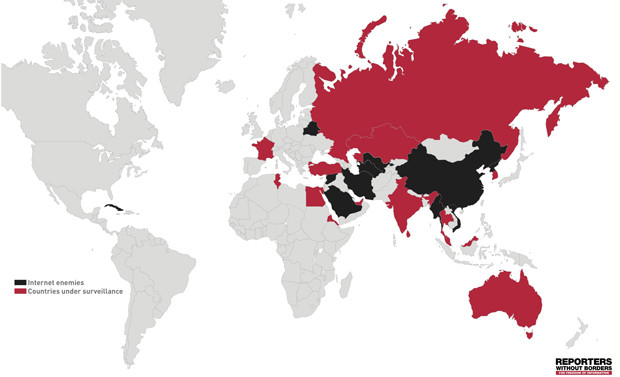Press freedom organisation Reporters Without Borders has claimed that 2011 "was the deadliest year for netizens", in light of the recorded deaths of those "making widespread use of the web".
But despite the level of violence in 2011 being "unmatched", RSF reports that the use of new media platforms has been "pushing back the boundaries of censorship".
"Online social networks complicate matters for authoritarian regimes that are trying to suppress unwanted news and information," today's report says.
The organisation writes that "it was thanks to netizens" that local communities came to learn about the deaths of activist Khaled Said in Egypt in 2010 and the Tunisian street vendor who set himself on fire in the same year, cases now considered "cornerstones of the Arab spring".
According to a BBC report on the killing of Said, "his death sparked protests and an internet campaign credited with helping to launch the popular uprising that toppled former President Hosni Mubarak".
In its report today RSF writes: "The revolution of microblogs and opinion aggregators and the faster dissemination of news and information that results, combined with the growing use of mobile phones to livestream video, are all increasing the possibilities of freeing information from its straightjacket."
The report also highlights "the mixing of journalism and activism", such as in Syria where "ordinary citizens, appalled by the bloodshed, are systematically gathering information for dissemination abroad".
In Syria, RSF adds, "activism and reporting have become one".
"Outraged by the regime's reaction, bloggers and netizens took it upon themselves to provide news and information once the foreign media has been expelled shortly after the start of the uprising.
"As the death toll mounted, ordinary citizens got involved, becoming activists and journalists at the same time, documenting what was happening as journalists would have done, but from the perspective of those who are clearly committed.
"Already seen during the Tunisian and Egyptian revolutions, this trend is much more pronounced in Syria."
The report details how citizens worked to obtain and distribute information where the media could not, such as by capturing video on mobile phones and then transferring the footage to video-streaming sites.
"Or it is filmed with video cameras and the video files are copied on to USB flash drives and passed from hand to hand until they can finally be posted online," RSF says.
Local people are also said to be making use of Skype and Mumble, while "Syrians who live near the border use Lebanese or Turkish servers to access the internet or mobile phone networks and thereby escape surveillance".
In the report released today to mark World Day Against Cyber Censorship, RSF also published a list of 'internet enemies" in 2012, which sees Bahrain and Belarus moved from being "under surveillance" in last year's report, to one of 12 "enemies".
The full list of internet enemies is below:
- Bahrain
- Belarus
- Burma
- China
- Cuba
- Iran
- North Korea
- Saudi Arabia
- Syria
- Turkmenistan
- Uzbekistan
- Vietnam
Free daily newsletter
If you like our news and feature articles, you can sign up to receive our free daily (Mon-Fri) email newsletter (mobile friendly).
Related articles
- "No longer can a news outlet’s name guarantee the audience will come and stay"
- #JournalismMatters: The challenges of journalism in exile
- RSF and NCTJ launch free online course for exiled journalists resettling in the UK
- What to do if you are threatened with a SLAPP lawsuit
- 'Journalism is extraordinarily resilient in the face of pressure and change'












